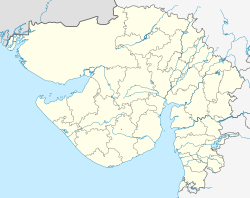Sanjan (Gujarat)
|
Sanjan સંજાણ |
|
|---|---|
| Town | |
| Location in Gujarat, India | |
| Coordinates: 20°12′4″N 72°48′4″E / 20.20111°N 72.80111°ECoordinates: 20°12′4″N 72°48′4″E / 20.20111°N 72.80111°E | |
| Country |
|
| State | Gujarat |
| District | Valsad |
| Population (2011) | |
| • Total | 15,544 |
| Languages | |
| • Official | Gujarati, Hindi, Dhodia |
| Time zone | IST (UTC+5:30) |
| Vehicle registration | GJ 15 |
| Nearest city | Vapi |
| Website | gujaratindia |
Sanjan (Gujarati: સંજાણ) is a town situated in the state of Gujarat, India. It is in the Umargam taluka of Valsad district. It is one of the earliest settlements of the Parsi people.
Sanjan is approximately 17 kilometres from the town of Daman, which was a Portuguese colony and an important trading station until 1961. It is located 70 km from the city of Valsad.
Sanjan is the location of the second railway station in Gujarat (the first station is on Umbergaon) on the Western railways (formerly the BB&CI Railways) just inside the Gujarat-Maharashtra border. Sanjan is in the Umargam taluka of Valsad district. Sanjan Bundar, the original settlement before the rail-head, is situated 2 km to the north of the railway station and is today a part of the extended town of Sanjan.
The river Varoli separates Sanjan from the nearby town of Umbergaon . The river's source comes from the Maharashtra Dam. But this river is very close to Sanjan and most of the religious part such as Ganpati Visharjan,etc is done by Sanjan people and near by people over this Varoli river. The Hindu festival of Mahashivratri is celebrated at the riverbank of Varoli in the Mahadev Temple.
Sanjan is believed to have been founded by Zoroastrian refugees who sought asylum in Gujarat in 698 AD. A widely believed legend is that the Zoroastrians were offered a filled pot of milk by Jadi Rana, the King of Sanjan to signify that his kingdom was full. In response, the Zoroastrians poured sugar into the milk without spilling any milk, stating they would adapt to the kingdom and cause no disorder, to which the King agreed. Those Zoroastrians, whose descendants are today known as the Parsis, are thought to have named the settlement after Sanjan in Greater Khorasan, the city of their origin. Although originally a Zoroastrian city, Sanjan was captured by Mahmud Begada of the Delhi Sultanate in the 1480s.
...
Wikipedia


